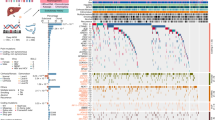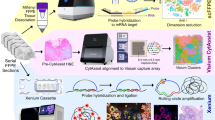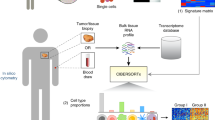Abstract
Gastric cancer is a heterogeneous disease with diverse molecular and histological subtypes. We performed whole-genome sequencing in 100 tumor-normal pairs, along with DNA copy number, gene expression and methylation profiling, for integrative genomic analysis. We found subtype-specific genetic and epigenetic perturbations and unique mutational signatures. We identified previously known (TP53, ARID1A and CDH1) and new (MUC6, CTNNA2, GLI3, RNF43 and others) significantly mutated driver genes. Specifically, we found RHOA mutations in 14.3% of diffuse-type tumors but not in intestinal-type tumors (P < 0.001). The mutations clustered in recurrent hotspots affecting functional domains and caused defective RHOA signaling, promoting escape from anoikis in organoid cultures. The top perturbed pathways in gastric cancer included adherens junction and focal adhesion, in which RHOA and other mutated genes we identified participate as key players. These findings illustrate a multidimensional and comprehensive genomic landscape that highlights the molecular complexity of gastric cancer and provides a road map to facilitate genome-guided personalized therapy.
This is a preview of subscription content, access via your institution
Access options
Subscribe to this journal
Receive 12 print issues and online access
$209.00 per year
only $17.42 per issue
Buy this article
- Purchase on Springer Link
- Instant access to full article PDF
Prices may be subject to local taxes which are calculated during checkout







Similar content being viewed by others
References
Wang, K. et al. Exome sequencing identifies frequent mutation of ARID1A in molecular subtypes of gastric cancer. Nat. Genet. 43, 1219–1223 (2011).
Zang, Z.J. et al. Exome sequencing of gastric adenocarcinoma identifies recurrent somatic mutations in cell adhesion and chromatin remodeling genes. Nat. Genet. 44, 570–574 (2012).
Govindan, R. et al. Genomic landscape of non-small cell lung cancer in smokers and never-smokers. Cell 150, 1121–1134 (2012).
Pleasance, E.D. et al. A comprehensive catalogue of somatic mutations from a human cancer genome. Nature 463, 191–196 (2010).
Hodis, E. et al. A landscape of driver mutations in melanoma. Cell 150, 251–263 (2012).
Cancer Genome Atlas Network. Comprehensive molecular characterization of human colon and rectal cancer. Nature 487, 330–337 (2012).
Church, D.N. et al. DNA polymerase ɛ and δ exonuclease domain mutations in endometrial cancer. Hum. Mol. Genet. 22, 2820–2828 (2013).
Kandoth, C. et al. Integrated genomic characterization of endometrial carcinoma. Nature 497, 67–73 (2013).
Lawrence, M.S. et al. Mutational heterogeneity in cancer and the search for new cancer-associated genes. Nature 499, 214–218 (2013).
Dulak, A.M. et al. Exome and whole-genome sequencing of esophageal adenocarcinoma identifies recurrent driver events and mutational complexity. Nat. Genet. 45, 478–486 (2013).
Nagarajan, N. et al. Whole-genome reconstruction and mutational signatures in gastric cancer. Genome Biol. 13, R115 (2012).
Youn, A. & Simon, R. Identifying cancer driver genes in tumor genome sequencing studies. Bioinformatics 27, 175–181 (2011).
Garcia, E., Carvalho, F., Amorim, A. & David, L. MUC6 gene polymorphism in healthy individuals and in gastric cancer patients from northern Portugal. Cancer Epidemiol. Biomarkers Prev. 6, 1071–1074 (1997).
Kwon, J.A. et al. Short rare MUC6 minisatellites-5 alleles influence susceptibility to gastric carcinoma by regulating gene. Hum. Mutat. 31, 942–949 (2010).
Zheng, H. et al. MUC6 down-regulation correlates with gastric carcinoma progression and a poor prognosis: an immunohistochemical study with tissue microarrays. J. Cancer Res. Clin. Oncol. 132, 817–823 (2006).
Koo, B.K. et al. Tumour suppressor RNF43 is a stem-cell E3 ligase that induces endocytosis of Wnt receptors. Nature 488, 665–669 (2012).
Sehgal, R.N., Gumbiner, B.M. & Reichardt, L.F. Antagonism of cell adhesion by an α-catenin mutant, and of the Wnt-signaling pathway by α-catenin in Xenopus embryos. J. Cell Biol. 139, 1033–1046 (1997).
Bogaerts, S., Vanlandschoot, A., van Hengel, J. & van Roy, F. Nuclear translocation of αN-catenin by the novel zinc finger transcriptional repressor ZASC1. Exp. Cell Res. 311, 1–13 (2005).
Majewski, I.J. et al. An α-E-catenin (CTNNA1) mutation in hereditary diffuse gastric cancer. J. Pathol. 229, 621–629 (2013).
van den Brink, G.R. et al. Sonic hedgehog regulates gastric gland morphogenesis in man and mouse. Gastroenterology 121, 317–328 (2001).
Ramalho-Santos, M., Melton, D.A. & McMahon, A.P. Hedgehog signals regulate multiple aspects of gastrointestinal development. Development 127, 2763–2772 (2000).
Blank, M.C. et al. Multiple developmental programs are altered by loss of Zic1 and Zic4 to cause Dandy-Walker malformation cerebellar pathogenesis. Development 138, 1207–1216 (2011).
Park, S.H., Kim, Y.S., Park, B.K., Hougaard, S. & Kim, S.J. Sequence-specific enhancer binding protein is responsible for the differential expression of ERT/ESX/ELF-3/ESE-1/jen gene in human gastric cancer cell lines: implication for the loss of TGF-β type II receptor expression. Oncogene 20, 1235–1245 (2001).
Nakanishi, Y. et al. Dclk1 distinguishes between tumor and normal stem cells in the intestine. Nat. Genet. 45, 98–103 (2013).
Ahuja, N. et al. Association between CpG island methylation and microsatellite instability in colorectal cancer. Cancer Res. 57, 3370–3374 (1997).
Kang, G.H. et al. CpG island methylation in premalignant stages of gastric carcinoma. Cancer Res. 61, 2847–2851 (2001).
Oue, N. et al. Reduced expression of the TSP1 gene and its association with promoter hypermethylation in gastric carcinoma. Oncology 64, 423–429 (2003).
Dvorsky, R., Blumenstein, L., Vetter, I.R. & Ahmadian, M.R. Structural insights into the interaction of ROCKI with the switch regions of RhoA. J. Biol. Chem. 279, 7098–7104 (2004).
Maesaki, R. et al. The structural basis of Rho effector recognition revealed by the crystal structure of human RhoA complexed with the effector domain of PKN/PRK1. Mol. Cell 4, 793–803 (1999).
Sahai, E., Alberts, A.S. & Treisman, R. RhoA effector mutants reveal distinct effector pathways for cytoskeletal reorganization, SRF activation and transformation. EMBO J. 17, 1350–1361 (1998).
Bae, C.D., Min, D.S., Fleming, I.N. & Exton, J.H. Determination of interaction sites on the small G protein RhoA for phospholipase D. J. Biol. Chem. 273, 11596–11604 (1998).
Chen, X. et al. Variation in gene expression patterns in human gastric cancers. Mol. Biol. Cell 14, 3208–3215 (2003).
Barker, N. et al. Lgr5+ve stem cells drive self-renewal in the stomach and build long-lived gastric units in vitro. Cell Stem Cell 6, 25–36 (2010).
Sato, T. et al. Single Lgr5 stem cells build crypt-villus structures in vitro without a mesenchymal niche. Nature 459, 262–265 (2009).
Watanabe, K. et al. A ROCK inhibitor permits survival of dissociated human embryonic stem cells. Nat. Biotechnol. 25, 681–686 (2007).
Deng, N. et al. A comprehensive survey of genomic alterations in gastric cancer reveals systematic patterns of molecular exclusivity and co-occurrence among distinct therapeutic targets. Gut 61, 673–684 (2012).
Kimura, Y. et al. Genetic alterations in 102 primary gastric cancers by comparative genomic hybridization: gain of 20q and loss of 18q are associated with tumor progression. Mod. Pathol. 17, 1328–1337 (2004).
Mermel, C.H. et al. GISTIC2.0 facilitates sensitive and confident localization of the targets of focal somatic copy-number alteration in human cancers. Genome Biol. 12, R41 (2011).
Tuncel, H. et al. PARP6, a mono(ADP-ribosyl) transferase and a negative regulator of cell proliferation, is involved in colorectal cancer development. Int. J. Oncol. 41, 2079–2086 (2012).
Pang, J.C. et al. KIAA0495/PDAM is frequently downregulated in oligodendroglial tumors and its knockdown by siRNA induces cisplatin resistance in glioma cells. Brain Pathol. 20, 1021–1032 (2010).
Fujii, Y. et al. CDX1 confers intestinal phenotype on gastric epithelial cells via induction of stemness-associated reprogramming factors SALL4 and KLF5. Proc. Natl. Acad. Sci. USA 109, 20584–20589 (2012).
Mutoh, H. et al. Cdx1 induced intestinal metaplasia in the transgenic mouse stomach: comparative study with Cdx2 transgenic mice. Gut 53, 1416–1423 (2004).
Rau, T.T. et al. Methylation-dependent activation of CDX1 through NF-κB: a link from inflammation to intestinal metaplasia in the human stomach. Am. J. Pathol. 181, 487–498 (2012).
Kwon, O.H. et al. Aberrant upregulation of ASCL2 by promoter demethylation promotes the growth and resistance to 5-fluorouracil of gastric cancer cells. Cancer Sci. 104, 391–397 (2013).
van der Flier, L.G. et al. Transcription factor achaete scute-like 2 controls intestinal stem cell fate. Cell 136, 903–912 (2009).
Wang, J. et al. Cadherin-17 induces tumorigenesis and lymphatic metastasis in gastric cancer through activation of NFκB signaling pathway. Cancer Biol. Ther. 14, 262–270 (2013).
Nagl, N.G. Jr., Zweitzig, D.R., Thimmapaya, B., Beck, G.R. Jr. & Moran, E. The c-myc gene is a direct target of mammalian SWI/SNF-related complexes during differentiation-associated cell cycle arrest. Cancer Res. 66, 1289–1293 (2006).
Guan, B., Wang, T.L. & Shih Ie, M. ARID1A, a factor that promotes formation of SWI/SNF-mediated chromatin remodeling, is a tumor suppressor in gynecologic cancers. Cancer Res. 71, 6718–6727 (2011).
Matsusaka, K. et al. Classification of Epstein-Barr virus–positive gastric cancers by definition of DNA methylation epigenotypes. Cancer Res. 71, 7187–7197 (2011).
Zouridis, H. et al. Methylation subtypes and large-scale epigenetic alterations in gastric cancer. Sci. Transl. Med. 4, 156ra140 (2012).
Matsuzaki, K. et al. The relationship between global methylation level, loss of heterozygosity, and microsatellite instability in sporadic colorectal cancer. Clin. Cancer Res. 11, 8564–8569 (2005).
Wilson, A.S., Power, B.E. & Molloy, P.L. DNA hypomethylation and human diseases. Biochim. Biophys. Acta 1775, 138–162 (2007).
Sahai, E. & Marshall, C.J. RHO-GTPases and cancer. Nat. Rev. Cancer 2, 133–142 (2002).
Braga, V.M., Machesky, L.M., Hall, A. & Hotchin, N.A. The small GTPases Rho and Rac are required for the establishment of cadherin-dependent cell-cell contacts. J. Cell Biol. 137, 1421–1431 (1997).
Coleman, M.L. & Olson, M.F. Rho GTPase signalling pathways in the morphological changes associated with apoptosis. Cell Death Differ. 9, 493–504 (2002).
Coleman, M.L. et al. Membrane blebbing during apoptosis results from caspase-mediated activation of ROCK I. Nat. Cell Biol. 3, 339–345 (2001).
Cox, E.A., Sastry, S.K. & Huttenlocher, A. Integrin-mediated adhesion regulates cell polarity and membrane protrusion through the Rho family of GTPases. Mol. Biol. Cell 12, 265–277 (2001).
Sahai, E. & Marshall, C.J. Differing modes of tumour cell invasion have distinct requirements for Rho/ROCK signalling and extracellular proteolysis. Nat. Cell Biol. 5, 711–719 (2003).
Yoshioka, K., Nakamori, S. & Itoh, K. Overexpression of small GTP-binding protein RhoA promotes invasion of tumor cells. Cancer Res. 59, 2004–2010 (1999).
Sahai, E., Garcia-Medina, R., Pouyssegur, J. & Vial, E. Smurf1 regulates tumor cell plasticity and motility through degradation of RhoA leading to localized inhibition of contractility. J. Cell Biol. 176, 35–42 (2007).
Matsuoka, T. et al. RhoA/ROCK signaling mediates plasticity of scirrhous gastric carcinoma motility. Clin. Exp. Metastasis 28, 627–636 (2011).
Sakata-Yanagimoto, M. et al. Somatic RHOA mutation in angioimmunoblastic T cell lymphoma. Nat. Genet. 46, 171–175 (2014).
Palomero, T. et al. Recurrent mutations in epigenetic regulators, RHOA and FYN kinase in peripheral T cell lymphomas. Nat. Genet. 46, 166–170 (2014).
Yoo, H.Y. et al. A recurrent inactivating mutation in RHOA GTPase in angioimmunoblastic T cell lymphoma. Nat. Genet. 46, 371–375 (2014).
Saunders, C.T. et al. Strelka: accurate somatic small-variant calling from sequenced tumor-normal sample pairs. Bioinformatics 28, 1811–1817 (2012).
Greenman, C. et al. Patterns of somatic mutation in human cancer genomes. Nature 446, 153–158 (2007).
Koo, B.K. et al. Controlled gene expression in primary Lgr5 organoid cultures. Nat. Methods 9, 81–83 (2012).
Wang, J. et al. CREST maps somatic structural variation in cancer genomes with base-pair resolution. Nat. Methods 8, 652–654 (2011).
Staaf, J. et al. Normalization of Illumina Infinium whole-genome SNP data improves copy number estimates and allelic intensity ratios. BMC Bioinformatics 9, 409 (2008).
Wang, K. et al. PennCNV: an integrated hidden Markov model designed for high-resolution copy number variation detection in whole-genome SNP genotyping data. Genome Res. 17, 1665–1674 (2007).
Olshen, A.B., Venkatraman, E.S., Lucito, R. & Wigler, M. Circular binary segmentation for the analysis of array-based DNA copy number data. Biostatistics 5, 557–572 (2004).
Yau, C. et al. A statistical approach for detecting genomic aberrations in heterogeneous tumor samples from single nucleotide polymorphism genotyping data. Genome Biol. 11, R92 (2010).
Wang, K. et al. Genomic landscape of copy number aberrations enables the identification of oncogenic drivers in hepatocellular carcinoma. Hepatology 58, 706–717 (2013).
Hu, J. Cancer outlier detection based on likelihood ratio test. Bioinformatics 24, 2193–2199 (2008).
Kanehisa, M., Goto, S., Sato, Y., Furumichi, M. & Tanabe, M. KEGG for integration and interpretation of large-scale molecular data sets. Nucleic Acids Res. 40, D109–D114 (2012).
Storey, J.D. & Tibshirani, R. Statistical significance for genomewide studies. Proc. Natl. Acad. Sci. USA 100, 9440–9445 (2003).
Acknowledgements
We thank J. Shen for assistance with bioinformatics and clinicians at the Hong Kong Hospital Authority for clinical care. We thank Illumina for performing whole-genome sequencing, TruSeq and array experiments and the Centre for Genomics Sciences at the University of Hong Kong for other sequencing services. Funding for the whole-genome sequencing study and associated validation was provided by Pfizer. Funding for the methylation analysis was provided by the Research Grants Council of the Hong Kong Special Administrative Region (General Research Fund grant HKU7719/10M). Funding for the functional assays was provided by a donation from S.T. Pan.
Author information
Authors and Affiliations
Contributions
M.M., S.Y.L., J.X. and S.T.Y. conceived the study. S.T.Y., S.Y.L., J.X. and M.M. directed the study. K.W., S.T.S., J.X., M.M., S.T.Y. and S.Y.L. contributed to the project design. K.W., H.C.S., S.D., K.H.C., G.H.W.C., T.X. and J.F. performed the bioinformatics data analysis. S.P.L., H.H.N.Y., A.S.Y.C., W.Y.T., S.L.H., A.K.W.C., J.L.K.M., M.K.N. and A.S.C. performed experiments and other molecular analysis and analyzed data. H.H.N.Y., V.F., Y.P.C., V.S.W.L. and H.C. contributed to RHOA functional assays. K.M.C., S.L., A.S.C. and P.A.R. contributed samples, data and/or comments on the manuscript. K.W., S.T.Y., M.M. and S.Y.L. analyzed and interpreted data and wrote the manuscript with assistance and final approval from all authors.
Corresponding authors
Ethics declarations
Competing interests
K.W., J.X., S.T.S., S.D., T.X., J.F., P.A.R. and M.M. are or were employed by Pfizer, Inc.
Supplementary information
Supplementary Text and Figures
Supplementary Figures 1–27 and Supplementary Note (PDF 10935 kb)
Supplementary Tables 1–18
Supplementary Tables 1–18 (XLSX 9028 kb)
Rights and permissions
About this article
Cite this article
Wang, K., Yuen, S., Xu, J. et al. Whole-genome sequencing and comprehensive molecular profiling identify new driver mutations in gastric cancer. Nat Genet 46, 573–582 (2014). https://doi.org/10.1038/ng.2983
Received:
Accepted:
Published:
Issue Date:
DOI: https://doi.org/10.1038/ng.2983
This article is cited by
-
The spectrum of TP53 mutations in Rwandan patients with gastric cancer
Genes and Environment (2024)
-
Leveraging synthetic lethality to uncover potential therapeutic target in gastric cancer
Cancer Gene Therapy (2024)
-
YTHDF2 exerts tumor-suppressor roles in gastric cancer via up-regulating PPP2CA independently of m6A modification
Biological Procedures Online (2023)
-
Pan-cancer analysis identifies RNF43 as a prognostic, therapeutic and immunological biomarker
European Journal of Medical Research (2023)
-
A comprehensive insight into the correlation between ncRNAs and the Wnt/β-catenin signalling pathway in gastric cancer pathogenesis
Cell Communication and Signaling (2023)



